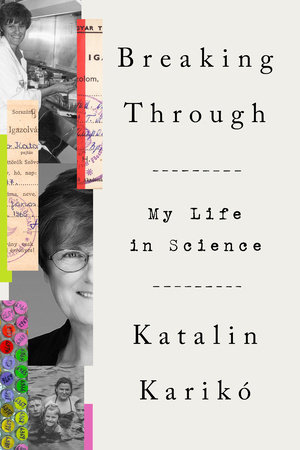One day in 1997, University of Pennsylvania molecular biologist Katalin (Kati) Karikó met a new hire at the photocopier who would change the trajectory of her research forever. At 42, the scientist had made little headway with her big idea that mRNA—the ephemeral molecule that instructs cells to make proteins—could be commandeered to help the body fight disease. Her grant proposals to study the therapeutic potential of mRNA continued to get rejected. She had no budget, no staff, and very little prestige.
Karikó introduced herself to the “copier-hogging immunologist,” Drew Weismann, and asked about his work. He planned to create vaccines against infectious diseases and discussed ways to deliver an antigen into cells to trigger the body’s own immune response. At once, Karikó saw another prospective role for her pet molecule and a long-standing collaboration was born that laid a strong foundation for the mRNA-based vaccines that proved vital during the COVID-19 pandemic. In Breaking Through, Karikó’s page-turning memoir, the talented and tenacious researcher recounts the origins and evolution of her scientific journey.
Karikó grew up in a small town in Hungary, the daughter of a skilled butcher. There, a high school biology teacher introduced her to a book—endocrinologist Hans Selye’s The Stress of Life— that would resonate with her both as an introduction to scientific thinking and as a guidebook to living well. Nature “rarely replies to questions unless they are put to her in the form of experiments to which she can say yes or no,” wrote Selye in that book in 1956.
Selye’s observations helped Karikó realized she wanted to spend her life designing experiments that would contribute to human knowledge, and her parents encouraged her to become a “kutató”— Hungarian for “searcher”— or in English, a researcher.
She earned her PhD from the prestigious Biological Research Center at Szeged in Hungary, where she began her exploratory research on medicinal applications for RNA until her funding was pulled. When she found a postdoctoral position in Philadelphia, she moved to the United States with her husband and toddler Susan with the family’s meagre savings sewn into the little girl’s teddy bear.
“Do not blame,” wrote Seyle. “Focus on what you can control. Transform bad stress into good stress.” This advice would serve Karikó well over the course of her nearly four decade long academic career, a period, she writes, in which she was belittled, ignored when her research did not win government grants or any private funding.
Still, nothing upset her as much as one early lab finding: synthetic mRNA triggered an inflammatory immune response in cells. An mRNA vaccine might still have been possible, Karikó and Weismann reasoned, but mRNA would be useless as therapeutic medicine until they figured out a way to keep it from activating the immune system.
In 2005, when the pair reported that a modified mRNA produced a non-inflammatory immune response in cells, their landmark finding, which would eventually be licensed by two biotech companies, went unheralded. Meanwhile, in a rude reminder that lab space is often allocated based on the funding a researcher brings in, Karikó was moved to a tiny room which, she writes, was not conducive for working with mRNA. It was the last straw.
In 2013, Karikó received job offers from the two companies that had licensed the modified mRNA technology— BioNTech in Germany and Moderna in the United States. When she packed her bags and left temporarily for Germany, her husband and their daughter Susan —the latter of whom was now a two-time Olympic gold medalist— stayed behind.
Karikó compares her science with her daughter’s rowing. The crew rows backward, she observes, without a view of the finish line. As she has done in the lab, they must trust that if they give it their all, their hard work will bring them to the right destination.
Karikó’s discovery found a meaningful application during the COVID-19 pandemic, but the story of the synthetic mRNA technology will not end here. Scientists are studying its therapeutic potential for various cancers, cystic fibrosis, and rare metabolic disorders, as well as for vaccines against other infectious diseases, Karikó writes. In the next decade, she predicts, there will be an explosion of new mRNA therapies and vaccines. Her moving memoir offers a fascinating glimpse into the dead ends and hard work that led up to this important discovery while highlighting critical shortcomings in the scientific reward system.
